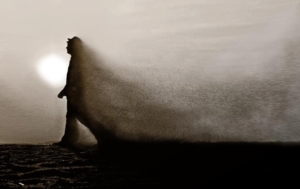February 14, 2024
Ash Wednesday
Click here for previous Sermon Posts
Click here for the Prayers of the People.
“Pardon Our Dust”
The Reverend Linda Mackie Griggs
Recording of the sermon:
Ash Wednesday
14 February 2024
Isaiah 58:1-12
Remember that you are dust, and to dust you shall return.
This is why we are here tonight. The familiar words repeated quietly. The gritty feel of ash on your forehead. The shape of the cross. Looking at your neighbors, realizing that it marks us all.
We are mortal. We are flawed. We are called to repent.
We are beloved and forgiven.
The ashes, made from burning last year’s Palm Sunday branches, are replete with meaning and tension.
Remember that you are dust…
We are the dust of Creation, loved into being from the beginning of time by the One who calls all of Creation very good.
…and to dust you shall return.
“Pardon our dust.”
We are in a process of constant renovation and renewal; as Otis Moss III writes, we are “…in the messy process of developing, working, breaking, and rebuilding. Every one of us could wear one of those signs.”
This is part of the tension of this day; on the one hand knowing that we are flawed and messy with construction dust, and on the other hand knowing that God’s abundant grace brings us to our knees–in repentance, yes, and gratitude as well. This is the tension of the Christian life of faith—the same tension that entwines loss and renewal, chaos and creativity, life and death. We hold, and are held by God, in this tension.
In our Old Testament reading, Isaiah points us to this tension as he criticizes Israel—like a cranky contractor demolishing their assumptions and sending the dust of their arrogance flying into the air.
In this passage Isaiah has taken Israel to task for forgetting the meaning, intent, and purpose of their ritual acts. The people had forgotten the true nature of their relationship with God and slipped back into old idolatrous habits. They felt that God should shower blessings upon them in return for their outward signs of worship, and then were dismayed when God did not seem to be holding up God’s part of the transaction. But Isaiah chastises them, saying that worship is not simply transactional. It must be relational.
Isaiah mocks their pleas to God:
“’Why do we fast, but you do not see? Why humble ourselves, but you do not notice?’”
As if the whole point of what they were doing was simply to attract God’s attention. Isaiah denounces the hypocrisy of making the right motions and saying the right words, yet not also practicing true righteousness and justice by caring for the marginalized and oppressed:
“’Look, you serve your own interest on your fast day, and oppress all your workers…. you fast only to quarrel and fight and to strike with a wicked fist.’”
Isaiah says that acts of worship that do not also reflect God’s love in the world do not constitute the fast that God requires.
He demands to know: Is this the fast that God chooses?
No!
Then why are we here, participating in this ritual, getting ashes on our heads?
That’s the tension. The tension we need today. Isaiah’s words invite us to ponder why we have come here this evening. Have we come out of habit? Duty? Yearning? Isaiah’s words, I hope, prompt us to feel, or perhaps to feel more strongly, the pull of this day; the challenge of the ashes that we are about to receive.
Remember that you are dust, and to dust you shall return.
The purpose of a holy Lent is to help us discern what God is calling out of us, not what we should expect from God in return for our Ash Wednesday worship and Lenten spiritual practices of giving something up, or taking something on. God has already loved us into being from the dust of Creation, and the grace that continues to flow from that love is irrevocable. Ours is to respond by reflecting that love and grace into the world. Our actions here today, and in this season, must be rooted in that invitation; that challenge.
Pardon my dust.
Anyone who has been involved in a renovation project is familiar with what it entails—the planning, the gutting, the mess. It isn’t that different with our Lenten discipline, as we do the hard work of renovating our spiritual lives; critically looking at ourselves, facing what needs to change, and then demolishing a structure that doesn’t serve us well anymore; clearing away the detritus and debris of those things that hold us back from making more room for God. With the tools of self-examination, fasting, prayer and scripture-reading we begin to rebuild something new—but not without cost. We need to repent of thinking that our lives are just about ourselves, allowing vulnerability, humility, generosity and gratitude to flow, and renewing our deep connection with God, Creation, and our siblings in Christ.
It’s a big project. Which is why it is fortunate that we have forty days to get started. God calls us into this work of renovation, and to be faithful even when things, as often happens with renovations, don’t go as planned. Because being human means that we are flawed—covered in construction dust. But we are at the same time beloved and forgiven. All of us, marked by the cross, make this Lenten journey together, upholding one another as companions on the journey. My prayer for each of us this Ash Wednesday is for a holy and dusty Lent,
creating new space within us for the boundless grace of God, the redeeming love of Jesus, and the bracing challenge of the Spirit.

